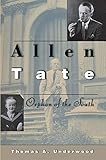Allen Tate : Orphan of the South / Thomas A. Underwood.
Material type: TextPublisher: Princeton, NJ : Princeton University Press, [2021]Copyright date: ©2000Description: 1 online resource (456 p.) : 22 halftonesContent type:
TextPublisher: Princeton, NJ : Princeton University Press, [2021]Copyright date: ©2000Description: 1 online resource (456 p.) : 22 halftonesContent type: - 9780691228280
- Agrarians (Group of writers) -- Biography
- Authors, American -- Homes and haunts -- Southern States
- Authors, American -- 20th century -- Biography
- Critics -- United States -- Biography
- BIOGRAPHY & AUTOBIOGRAPHY / Literary
- Aesthetic theory
- Agrarian movement
- Alexandria Gazette
- Belgion, Montgomery
- Benfolly (Tate estate)
- Bookman
- Chattanooga Times
- Communism
- Criterion
- Distributists
- Dreiser, Theodore
- Foerster, Norman
- Free America
- Gannett, Lewis
- Guardian
- Hecht, Anthony
- Holden, Raymond
- Humanism
- Imagist poetry movement
- Johns Hopkins Review
- Johnson, Theodore
- Kenyon Review
- Lanier, Lyle
- Lanier, Sidney
- Literary Review
- Marxism
- Morley, Christopher
- Nashville Banner
- Nashville Tennessean
- Nation
- New Criterion
- North American Review
- Owsley, Harriet
- O’Neill, Eugene
- Page, Walter Hines
- Pinckney, Josephine
- Poetry Review
- Potter, David M
- Proust, Marcel
- Rahv, Philip
- Reviewer
- Scopes trial
- Secessionist poets
- Singal, Daniel
- Southern Literary Magazine
- Southern Review
- Tate, Helen Heinz (wife)
- Taylor, Peter
- Untermeyer, Jean
- Van Doren, Irita
- Virginia Quarterly Review
- Wallace, Clarence B
- anti-Semitism
- transition
- 818 21
- PS3539.A74
- online - DeGruyter
| Item type | Current library | Call number | URL | Status | Notes | Barcode | |
|---|---|---|---|---|---|---|---|
 eBook
eBook
|
Biblioteca "Angelicum" Pont. Univ. S.Tommaso d'Aquino Nuvola online | online - DeGruyter (Browse shelf(Opens below)) | Online access | Not for loan (Accesso limitato) | Accesso per gli utenti autorizzati / Access for authorized users | (dgr)9780691228280 |
Browsing Biblioteca "Angelicum" Pont. Univ. S.Tommaso d'Aquino shelves, Shelving location: Nuvola online Close shelf browser (Hides shelf browser)

|

|

|

|

|

|

|
||
| online - DeGruyter Obligations of Citizenship and Demands of Faith : Religious Accommodation in Pluralist Democracies / | online - DeGruyter The Other God that Failed : Hans Freyer and the Deradicalization of German Conservatism / | online - DeGruyter Elizabeth I : War and Politics, 1588-1603 / | online - DeGruyter Allen Tate : Orphan of the South / | online - DeGruyter Eugene Onegin : A Novel in Verse: Commentary (Vol. 2) / | online - DeGruyter Insecure Prosperity : Small-Town Jews in Industrial America, 1890-1940 / | online - DeGruyter Channeling Violence : The Economic Market for Violent Television Programming / |
Frontmatter -- Contents -- Introduction "My Terrible Family" -- Chapter One: "Mother Wanted Me at Home" -- Chapter Two: "Unlike a Natural Mother" -- Chapter Three: "O Poet, O Allen Tate, O Hot Youth!" -- Chapter Four: "They Used to Call Me 'the Yankee' " -- Chapter Five: God the Father and the South -- Chapter Six An Agrarian and "the Brethren" -- Chapter Seven: Orphan of the South -- Chapter Eight: Fatherless Fame -- Chapter Nine: A Family Reconstructed -- A Note on the Text and Abbreviations Used in the Notes -- Notes -- Sources and Acknowledgments -- Index
restricted access online access with authorization star
http://purl.org/coar/access_right/c_16ec
Despite his celebrity and his fame, a series of literary feuds and the huge volume of sources have, until now, precluded a satisfying biography of Allen Tate. Anyone interested in the literature and history of the American South, or in modern letters, will be fascinated by his life. Poetry readers recognize Tate, whom T. S. Eliot once called the best poet writing in America, as the author of some of the twentieth century's most powerful modernist verse. Others know him as a founder of The Fugitive, the first significant poetry journal to emerge from the South. Tate joined William Faulkner and others in launching what came to be known as the Southern Literary Renaissance. In 1930, he became a leader of the Southern Agrarian movement, perhaps America's final potent critique of industrial capitalism. By 1938, Tate had departed politics and written The Fathers, a critically acclaimed novel about the dissolution of the antebellum South. He went on to earn almost every honor available to an American poet. His fatherly mentoring of younger poets, from Robert Penn Warren to Robert Lowell, and of southern novelists--including his first wife, Caroline Gordon--elicited as much rebellion as it did loyalty. Long-awaited and based on the author's unprecedented access to Tate's personal papers and surviving relatives, Orphan of the South brings Tate to 1938. It explores his attempt, first through politics and then through art, to reconcile his fierce talent and ambition with the painful history of his family and of the South. Tate was subjected to, and also perpetuated, fictional interpretations of his ancestry. He alternately abandoned and championed Southern culture. Viewing himself as an orphan from a region where family history is identity, he developed a curious blend of spiritual loneliness and ideological assuredness. His greatest challenge was transforming his troubled genealogy into a meaningful statement about himself and Southern culture as a whole. It was this problem that consumed Tate for the first half of his life, the years recorded here. This portrait of a man who both made and endured American literary history depicts the South through the story of one of its treasured, ambivalent, and sometimes wayward sons. Readers will gain a fertile understanding of the Southern upbringing, education, and literary battles that produced the brilliant poet who was Allen Tate.
Mode of access: Internet via World Wide Web.
In English.
Description based on online resource; title from PDF title page (publisher's Web site, viewed 01. Dez 2022)


